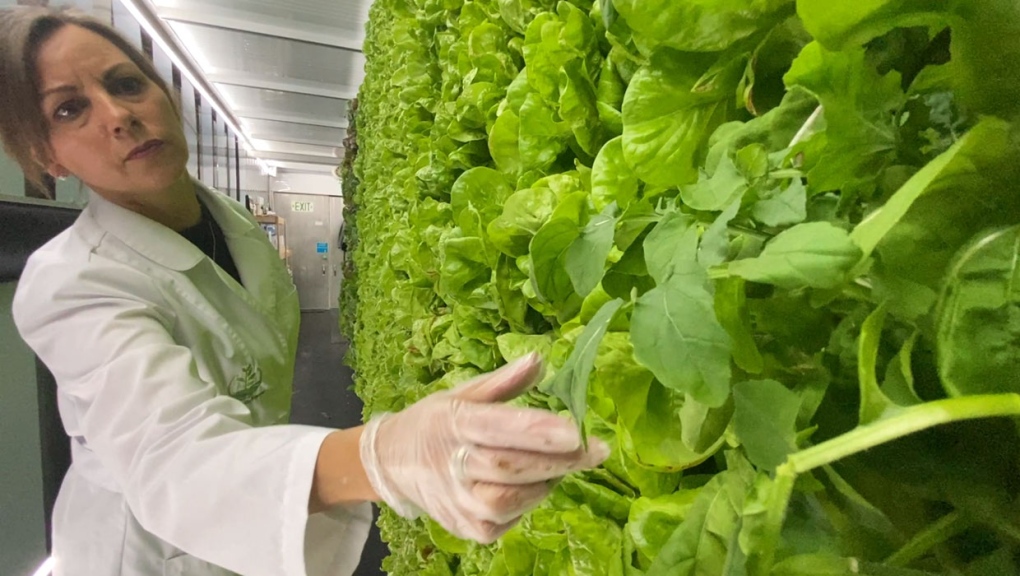High-tech, year-round sustainable farming comes to Cochrane, Alta.
A high-tech farm near Cochrane, west of Calgary, is producing thousands of heads of lettuce, and other vegetables every week, even in the darkest and coldest days of winter.
Good Life Farms Inc. operates a vertical-wall hydroponic garden inside two shipping containers.
"We are growing everything from arugula to graziano leaf lettuce, KC butterhead lettuce (and) we are actually experimenting with some root vegetables as well," said Good Life Farms founder Chad Randal.
"We've grown turnips, radishes (and) we're growing carrots as well. We're just actually planting our first tomato crop. A lot of these items, we feel that there's economic value in growing them."
Before setting his sights on hyperlocal farming, Randal spent his career in the oil patch running a successful water conservation and treatment company.
That experience piqued his interest in the sea-can gardens, as the computer-operated system occupies just under 30 square metres (320 square feet) and uses just 20 litres of water a day.
"They're a completely self-contained system. Everything has been engineered and designed to stay in a smaller footprint, eight by 40 foot footprint. We can essentially move these wherever we want, so we can set these up in parking lots.
"We can operate them on a smaller scale for smaller communities."
Randal sees it as a way for communities to set up local container farms to help overcome food scarcity issues. He says container farms can be trucked into small communities and be up and running quickly, supplying enough ongoing fresh produce for a small town.
"Our vision is to establish fresh produce for everyone or to make food available to the local community. We envision putting these facilities in all the small towns throughout Alberta, wherever opportunities present themselves."
The container farms are also partly powered by rows of solar panels on their roof, which supply just under 50 per cent of the power even through the dark days of winter.
"We still pull off the grid as well, but we are using green energy off the grid," said Randal.
"We've established ourselves as a microgeneration facility as well, but the facilities essentially take all the all the energy that the solar power, or the solar panel system can produce."

Local chef Jason MacKenzie regularly stops by Good Life's Cochrane facility to harvest fresh produce for meals he creates at a nearby retreat centre.
"It's community supportive, it's fantastic for the environment," said MacKenzie.
"I'm getting fresh produce on a daily basis if I need it that hasn't been shipped up from California."
He says it's an excellent source of fresh food, on any day of the year.
"If you went out into your garden on July day and picked some fresh lettuce, that's what you're getting (here), but I can do this in December and January, February, March – year round – and the quality is always there. The nutritional value is always there."
Randal plans to sell his fresh produce at local farmers' markets, and has recently inked a deal to sell his produce at a local retail grocery in Cochrane.
Each seacan garden costs approximately $200,000 to initially get up and running. They have an expected lifespan of more than 30 years.
Good Life Farms’ Cochrane-based facility is one of about 600 similar systems worldwide.
Randal sees his facility, in part, as a proof-of-concept for southern Alberta's climate, but says it has been so successful, he has already set his eyes on expanding and opening another seacan farm in a nearby southern Alberta community.
CTVNews.ca Top Stories

Mystik Dan wins the 150th Kentucky Derby at Churchill Downs in a three-horse photo finish
Mystik Dan won the 150th Kentucky Derby in a photo finish, edging out Forever Young and Sierra Leone for the upset victory.
Bodies recovered in Mexico likely 2 Australians, 1 American who went missing: officials
Three bodies recovered in an area of Baja California are likely to be those of the two Australians and an American who went missing last weekend during a camping and surfing trip, the state prosecutor’s office said Saturday.
No proof man lied to brother about number of kittens born in litter, B.C. tribunal rules
A man was denied a $5,000 payout from his brother after a B.C. tribunal dismissed his claim disputing how many kittens were born in a litter.
Work stoppage possible as WestJet issues lockout notice to maintenance engineers' union
A lockout notice issued by WestJet to a union representing aircraft maintenance engineers could result in a work stoppage next week.
'I just can't believe that it took so long': Body found in wreckage 3 months after deadly fire
A man accused of arson in a January Old Strathcona apartment fire is expected to be charged with manslaughter after a body was discovered in the burned building late last month.
Quebec police hand out hundreds of tickets to Hells Angels and other bikers before 'first run' meeting
Quebec provincial police handed out hundreds of fines to Hells Angels members and other supporting motorcycle clubs who met for their 'first run' in a small town near Sherbrooke, Que.
Princess Anne lays wreath at B.C. veteran's cemetery; receives 21-gun salute
Princess Anne paid tribute to veterans buried at a cemetery in British Columbia today, laying a wreath to honour the more than 2,500 military personnel and family members buried there.
London Drugs begins 'gradual reopening' on 7th day after cyberattack
Almost a week after all London Drugs stores across Western Canada abruptly closed amid a cyberattack, they began a "gradual reopening" on Saturday.
Russia puts Ukrainian President Zelenskyy on its wanted list
Russia has put Ukrainian President Volodymyr Zelenskyy on its wanted list, Russian state media reported Saturday, citing the interior ministry’s database.































